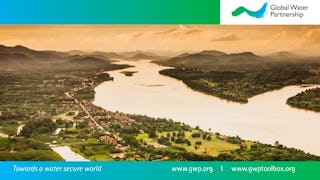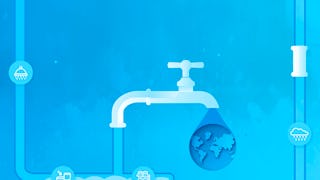Water Supply and Sanitation Policy in Developing Countries Part 2 is our second MOOC in a two-part sequence, and looks at ‘Developing Effective Interventions’. Here we invite you to develop analytical skills and deep understanding about a complex, controversial policy problem – one with no simple, easy answers. About half a billion people on our planet still lack access to improved water supplies and about two billion do not have improved sanitation services, leading to an unknown but very large number of avoidable deaths each year from water-related diseases. Millions of dollars are spent on avoidable health care expenditures, and people – mostly women – spend many billions of hours carrying water from sources outside the home. Reducing these costs is a major global challenge for us all in the 21st century. Join us to explore the challenging and complex political, economic, social, and technical dimensions of the policy interventions that donors, national governments and water utilities use to address this challenge. This second MOOC consists of the following seven sessions:



Water Supply and Sanitation Policy in Developing Countries Part 2: Developing Effective Interventions


Instructors: Dr Duncan Thomas
9,161 already enrolled
Included with 
(78 reviews)
Skills you'll gain
Details to know

Add to your LinkedIn profile
See how employees at top companies are mastering in-demand skills

There are 7 modules in this course
What's included
6 videos1 reading3 discussion prompts
What's included
6 videos1 reading4 discussion prompts
What's included
9 videos1 reading3 discussion prompts
What's included
9 videos1 reading3 discussion prompts
What's included
8 videos1 reading2 discussion prompts
What's included
7 videos1 reading3 discussion prompts
What's included
18 videos3 readings1 peer review6 discussion prompts
Earn a career certificate
Add this credential to your LinkedIn profile, resume, or CV. Share it on social media and in your performance review.
Instructors


Offered by
Explore more from Governance and Society
 Status: Preview
Status: PreviewUniversity of Manchester
 Status: Preview
Status: PreviewUniversity of Geneva
 Status: Preview
Status: PreviewBanco Interamericano de Desarrollo
 Status: Preview
Status: PreviewPolitecnico di Milano
Why people choose Coursera for their career




Learner reviews
78 reviews
- 5 stars
78.20%
- 4 stars
16.66%
- 3 stars
1.28%
- 2 stars
2.56%
- 1 star
1.28%
Showing 3 of 78
Reviewed on May 26, 2019
As a public health professional with keen interest in WASH, I found this course highly educative on the effective strategies for water and sanitation interventions in developing countries.
Reviewed on Jun 11, 2020
Very good course to understand the water problems in developing countries.
Reviewed on Jan 22, 2022
Excellent video presentation and interviews. Excellent reference articles. (Use the companion YouTube videos)

Open new doors with Coursera Plus
Unlimited access to 10,000+ world-class courses, hands-on projects, and job-ready certificate programs - all included in your subscription
Advance your career with an online degree
Earn a degree from world-class universities - 100% online
Join over 3,400 global companies that choose Coursera for Business
Upskill your employees to excel in the digital economy
Frequently asked questions
Access to lectures and assignments depends on your type of enrollment. If you take a course in audit mode, you will be able to see most course materials for free. To access graded assignments and to earn a Certificate, you will need to purchase the Certificate experience, during or after your audit. If you don't see the audit option:
The course may not offer an audit option. You can try a Free Trial instead, or apply for Financial Aid.
The course may offer 'Full Course, No Certificate' instead. This option lets you see all course materials, submit required assessments, and get a final grade. This also means that you will not be able to purchase a Certificate experience.
When you purchase a Certificate you get access to all course materials, including graded assignments. Upon completing the course, your electronic Certificate will be added to your Accomplishments page - from there, you can print your Certificate or add it to your LinkedIn profile. If you only want to read and view the course content, you can audit the course for free.
You will be eligible for a full refund until two weeks after your payment date, or (for courses that have just launched) until two weeks after the first session of the course begins, whichever is later. You cannot receive a refund once you’ve earned a Course Certificate, even if you complete the course within the two-week refund period. See our full refund policy.
More questions
Financial aid available,
¹ Some assignments in this course are AI-graded. For these assignments, your data will be used in accordance with Coursera's Privacy Notice.

